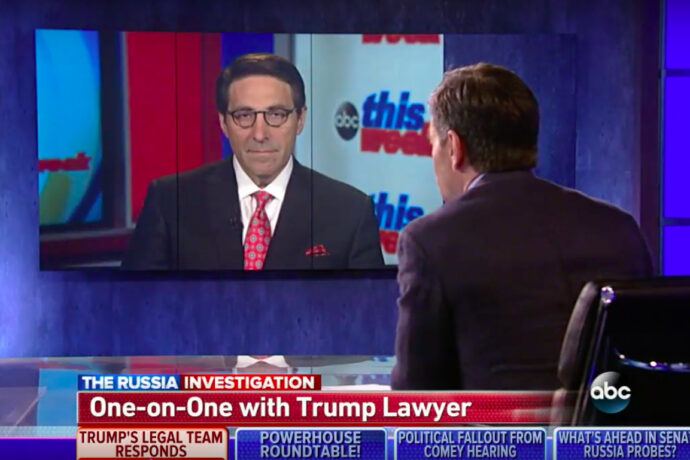Jay Sekulow has been making the rounds at right-wing media outlets (Fox, PJ Media, WND, Breitbart), but Sunday he made an appearance on the diabolical MSM: This Week with George Stephanopoulos. Without his familiar identifier as lead counsel for the American Center for Law and Justice (ACLJ), he was introduced as a member of Donald Trump’s legal team.
In case you’ve forgotten, ACLJ was part of the rise of Christian public interest law firms, beginning in the 1980s.* These groups pursued the religious right’s culture wars agenda in the courts focusing initially on battles over First Amendment religion clauses, abortion rights, and Christian education, then later including opposition to the expansion of LGBTQ rights and the promotion of hostility toward Muslims.
Sekulow was predictable in his comments on the Comey hearings: divert attention to Comey’s alleged leak, assert that Comey vindicated Trump on issues of collusion, and so forth.
More interesting to me is Sekulow’s appearance as a member of the President’s legal team. With no background as a defense attorney, Sekulow has a 30+ year track record in the forefront of religious right culture wars battles, often promoting the most extreme positions, both in the U.S. and abroad.
As political scientist Daniel Bennet noted on twitter, ACLJ has long been one of the most politicized of the Christian Right’s legal outfits. Founded in 1990 by Pat Robertson, ACLJ played a central role in promoting a narrative of persecution and minority status for conservative Christians. The name ACLJ was a deliberate play on the conservative bogyman, the formidable ACLU.
In 1996, then Executive Director of ACLJ Keith Fournier wrote in apocalyptic language about “Religious Cleansing in America.” Hans Hacker, in a 2005 book on the rise of these Christian law firms notes that (in 2005) the argument that Christians were a minority in need of protection was not persuasive in the broader religious right. That same year, Sekulow was chosen as one of Time magazine’s 25 most influential evangelicals.
A little over a decade later, conservative Christians across the country have come around to the ACLJ’s perspective and now see themselves as targeted by powerful elites, one step away from imprisoning and executing people for their faith. They conflate literal persecution experienced around the globe with their experiences in the U.S. in which their views are sometimes labeled bigoted and narrow-minded.
Yet many clamor to deny Muslins the very free exercise rights for which Sekulow, and now also his son Jordan, litigated, with the ACLJ leading the fight against the nonexistent effort by Muslims to take over America by implementing Sharia.
We’re seeing the rhetoric around “religious freedom” as Christian privilege, the denial of which is framed as persecution from the Trump Administration—but there are at least two other places to keep an eye Sekulow’s influence.
ACLJ has developed an international presence and launched The East African Center for Law and Justice in 2010 when several African countries were revising their constitutions. They worked to secure privileged status for “biblical principles,” including the outlawing of abortion (even when the mother’s life was in danger) and homosexuality, fighting for punishments as draconian as death and life imprisonment. Their efforts in that regard are detailed in this report by Political Research Associates.
Finally, remember when candidate Trump was asked whether overturning Roe v. Wade would mean punishing women who had abortions? Not yet schooled in the distinction between things the religious right says in public and those they say in private, he responded in a way that was completely logical given the rhetoric: “there would have to be some kind of punishment.” An outcry from mainstream anti-abortion groups ensued, leaving Trump’s campaign to backpedal and offer a series of reinterpretations. But Sekulow tackled this topic on his radio show, admitting what many of us knew to be true: that if Roe were overturned, states would be free to impose punishments and that, while it might be politically unpalatable to do so, it would be completely consistent in legal terms. Political unpalatability doesn’t seem to carry the weight it seemed to just a year ago.
It’s not clear at the moment whether Sekulow’s role with Trump goes beyond helping him navigate a potentially rough legal storm. But given what we know about how narrow the President’s circle of advisers has become, and the seeming way he parrots the most recent perspective of those around him, this could be an important development.
* In the interest of avoiding the debate over whether or we should call them “Christian” I note the following: I make no claim that they represent all Christians and the debate about whether they are “authentic” Christians is a matter for Christians to discuss, but a question not amenable to scholarly resolution, in part because there is no agreement upon standards to evaluate them. Particularly bothersome is the effort to throw out supposed statements of Jesus as though that should resolve the matter. Religions cannot be reduced to their sacred texts, as though though texts dropped out of the sky and require no interpretation. Moreover, there’s little reason to rest with Jesus as the sole authority. Jesus wasn’t even a Christian. Why not Paul? Why Not Moses? Why not Calvin or the Pope? Why not my mom?





